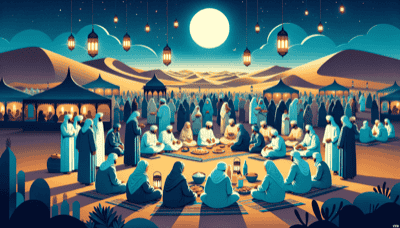We're here to help you keep count of the days to or since a date. Just click the button below and enter your chosen date to get started. Also choose the suggested days or search for a special day above #countingthedays

Day and Significance: Eid al-Fitr, known as "Festival of Breaking the Fast," is a significant religious holiday celebrated by Muslims worldwide, marking the end of Ramadan, the Islamic holy month of fasting. In Djibouti, a predominantly Muslim country, this day is a public holiday observed with great reverence and joy.
History: The history of Eid al-Fitr goes back to the time of Prophet Muhammad. It was instituted after the victory of the battle of Badr as a day for Muslims to rejoice and express gratitude to Allah for giving them strength during Ramadan.
Traditions: On the day of Eid al-Fitr in Djibouti:
Prayers: The day begins with special prayers called Salat al-Eid performed in large congregations at mosques or open areas. People wear their finest clothes and recite Takbeerat, praising Allah.
Charity: Before heading to prayer, Muslims perform an act of charity known as "Zakat al-Fitr" or "Fitrana," which is intended to purify those who fast from any indecent act or speech and to help the poor and needy.
Feasts: After prayers, families gather for a celebratory meal that breaks the month-long fast. Traditional dishes are prepared, and there is a strong emphasis on community feasting.
Visits: It's customary for people in Djibouti to visit relatives and friends, exchange gifts, particularly with children who often receive new clothes and money called "Eidi."
Festivities: The entire community indulges in festivities which may include music, dancing, and communal gatherings that reflect the local culture.
Djiboutians celebrate Eid al-Fitr not just as an end to fasting but also as a thanksgiving occasion where they seek forgiveness from others, mend strained relationships, and express solidarity within their community.